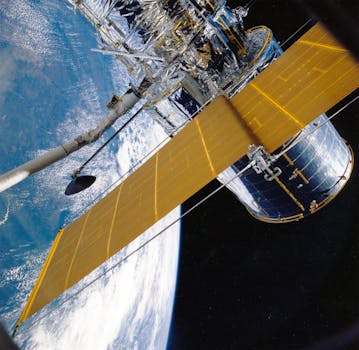The Future of Satellites: Revolutionizing Global Communication and Exploration
The future of satellites holds immense promise for revolutionizing global communication, exploration, and our understanding of the universe. With advancements in technology, satellites are becoming increasingly sophisticated, enabling new applications and services that transform the way we live and work.

The future of satellites is a rapidly evolving field, with significant advancements in technology and innovation. Future of satellites is an exciting and dynamic area of research and development, with far-reaching implications for global communication, exploration, and our understanding of the universe. Satellites have been a crucial part of modern life for decades, providing essential services such as navigation, communication, and weather forecasting. However, the next generation of satellites is poised to transform the industry, enabling new applications and services that will have a profound impact on our daily lives.
One of the most significant trends in the future of satellites is the development of small satellites, also known as smallsats. These tiny satellites, typically weighing less than 500 kilograms, are designed to be more affordable and flexible than traditional satellites. Smallsats are being used for a variety of applications, including Earth observation, communication, and scientific research. They offer several advantages over traditional satellites, including lower costs, faster development times, and increased maneuverability.
Another area of innovation in the future of satellites is the use of satellite constellations. A satellite constellation is a group of satellites that work together to provide global coverage and continuous service. Constellations are being developed for a range of applications, including communication, navigation, and Earth observation. They offer several benefits, including improved coverage, increased capacity, and enhanced reliability. Companies such as SpaceX, OneWeb, and Amazon are investing heavily in satellite constellations, with plans to launch thousands of satellites into orbit in the coming years.
The future of satellites also holds great promise for scientific research and exploration. Satellites are being used to study the Earth’s climate, oceans, and land surfaces, providing valuable insights into the health of our planet. They are also being used to explore the universe, with missions such as the James Webb Space Telescope and the Square Kilometre Array. These missions will enable scientists to study the formation of the universe, the properties of dark matter and dark energy, and the search for life beyond Earth.
In addition to these developments, the future of satellites is also being shaped by advancements in technology. Improvements in materials, propulsion systems, and electronics are enabling the development of more sophisticated satellites with increased capabilities. The use of artificial intelligence and machine learning is also becoming more prevalent, enabling satellites to operate more autonomously and make decisions in real-time.
The future of satellites is not without its challenges, however. The increasing number of satellites in orbit is raising concerns about space debris and the risk of collisions. The development of new regulations and standards is essential to ensure the long-term sustainability of space activities. Additionally, the use of satellites for military and surveillance purposes is raising concerns about privacy and security.
Despite these challenges, the future of satellites is an exciting and dynamic field, with immense potential for innovation and growth. As technology continues to evolve, we can expect to see new applications and services emerge, transforming the way we communicate, navigate, and understand the universe. The future of satellites is a future of endless possibility, and it will be fascinating to see how this technology continues to shape our world.
In conclusion, the future of satellites is a rapidly evolving field, with significant advancements in technology and innovation. The development of small satellites, satellite constellations, and new technologies is transforming the industry, enabling new applications and services that will have a profound impact on our daily lives. As we look to the future, it is clear that satellites will continue to play a vital role in shaping our world, and it will be exciting to see how this technology continues to evolve and improve.




